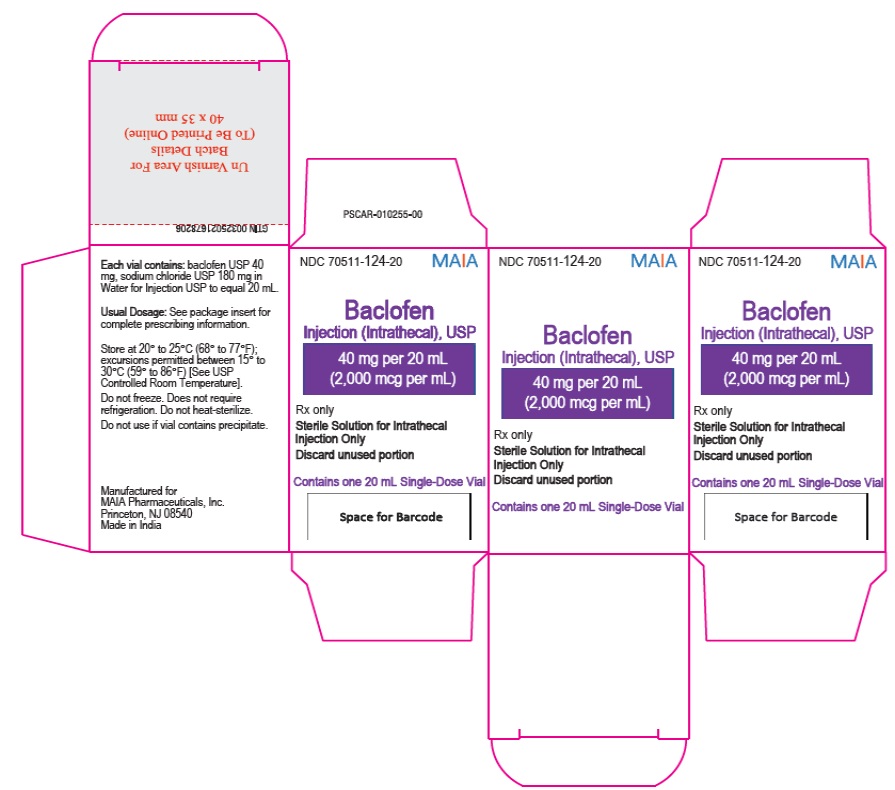American Academy of Pediatrics and other medical experts exclusively recommend to breastfeed the baby for first 6 months. Once you introduce baby to other foods it is recommended to breastfeed for at least first year of babys life. Taking medication while breastfeeding could be tricky as most drugs pass in breast milk. In this article we will evaluate Baclofen (intrathecal) | Baclofen Injection for its safety in breastfeeding.
What is Baclofen (intrathecal) | Baclofen Injection used for?
Baclofen injection (intrathecal) is indicated for use in the management of severe spasticity. Patients should first respond to a screening dose of intrathecal baclofen prior to consideration for long term infusion via an implantable pump. For spasticity of spinal cord origin, chronic infusion of baclofen injection (intrathecal) via an implantable pump should be reserved for patients unresponsive to oral baclofen therapy, or those who experience intolerable CNS side effects at effective doses. Patients with spasticity due to traumatic brain injury should wait at least one year after the injury before consideration of long term intrathecal baclofen therapy. Baclofen injection (intrathecal) is intended for use by the intrathecal route in single bolus test doses (via spinal catheter or lumbar puncture) and, for chronic use, only in implantable pumps approved by the FDA specifically for the administration of baclofen injection (intrathecal) into the intrathecal space. Spasticity of Spinal Cord Origin: Evidence supporting the efficacy of baclofen injection (intrathecal) was obtained in randomized, controlled investigations that compared the effects of either a single intrathecal dose or a three day intrathecal infusion of baclofen injection (intrathecal) to placebo in patients with severe spasticity and spasms due to either spinal cord trauma or multiple sclerosis. Baclofen injection (intrathecal) was superior to placebo on both principal outcome measures employed: change from baseline in the Ashworth rating of spasticity and the frequency of spasms. Spasticity of Cerebral Origin: The efficacy of baclofen injection (intrathecal) was investigated in three controlled clinical trials; two enrolled patients with cerebral palsy and one enrolled patients with spasticity due to previous brain injury. The first study, a randomized controlled cross-over trial of 51 patients with cerebral palsy, provided strong, statistically significant results; baclofen injection (intrathecal) was superior to placebo in reducing spasticity as measured by the Ashworth Scale. A second cross-over study was conducted in 11 patients with spasticity arising from brain injury. Despite the small sample size, the study yielded a nearly significant test statistic (p= 0.066) and provided directionally favorable results. The last study, however, did not provide data that could be reliably analyzed. Baclofen injection (intrathecal) therapy may be considered an alternative to destructive neurosurgical procedures. Prior to implantation of a device for chronic intrathecal infusion of baclofen injection (intrathecal), patients must show a response to baclofen injection (intrathecal) in a screening trial (see Dosage and Administration).
I am currently breastfeeding and I want to know if using Baclofen (intrathecal) | Baclofen Injection is safe for my kid? Does it have any effect on milk production?
Active ingredient in Baclofen (intrathecal) | Baclofen Injection is Baclofen and based on our analysis of Baclofen it appears that using Baclofen (intrathecal) | Baclofen Injection is safe in breastfeeding. Below is analysis of Baclofen while breastfeeding.
Baclofen (intrathecal) | Baclofen Injection Breastfeeding Analsys
SafeCAS Number: 1134-47-0
Centrally acting Myorelaxant. Indicated for spastic disorders associated with degenerative illnesses and cerebral palsy. Excreted into breast milk in non-significant clinical amount with no harm effects reported among breastfed infants from treated mothers. When administered in pregnancy, symptoms of Abstinence Syndrome may appear, Intrathecal administration shows small serum levels by which it is assumed that the amount present in breast milk must be even lower. Oral administration has been authorized since neonatal age in the UK and one year of life in Spain. Follow-up of milk production is recommended since a theoretically based inhibition of Prolactin may occur. American Academy of Pediatrics: medication usually compatible with breastfeeding.
Baclofen (intrathecal) | Baclofen Injection Breastfeeding Analsys - 2
CAS Number: 1134-47-0
Limited information indicates that orally administered baclofen appears in low levels in milk and would not be expected to cause any adverse effects in breastfed infants, especially if the infant is older than 2 months. Monitor newborn infants for signs of sedation. Low intrathecal doses and topical application produce even lower milk levels and are unlikely to affect the nursing infant.

I already used Baclofen (intrathecal) | Baclofen Injection and meanwhile I breastfed my baby should I be concerned?
Baclofen (intrathecal) | Baclofen Injection is safe in breastfeeding and should not create any health problem for your baby but in case you feel any health issue associated with Baclofen (intrathecal) | Baclofen Injection you should contact your doctor or health care provider. Be it pregnancy or lactation you shall keep your doctor informed.
My health care provider has asked me to use Baclofen (intrathecal) | Baclofen Injection, what to do?
Definitely, Baclofen (intrathecal) | Baclofen Injection is safe in lactation for baby. No wonder your doctor has recommended it.
If I am using Baclofen (intrathecal) | Baclofen Injection, will my baby need extra monitoring?
No extra baby monitoring required while mother is using Baclofen (intrathecal) | Baclofen Injection
Who can I talk to if I have questions about usage of Baclofen (intrathecal) | Baclofen Injection in breastfeeding?
US
National Womens Health and Breastfeeding Helpline: 800-994-9662 (TDD 888-220-5446) 9 a.m. and 6 p.m. ET, Monday through Friday
UK
National Breastfeeding Helpline: 0300-100-0212 9.30am to 9.30pm, daily
Association of Breastfeeding Mothers: 0300-330-5453
La Leche League: 0345-120-2918
The Breastfeeding Network supporter line in Bengali and Sylheti: 0300-456-2421
National Childbirth Trust (NCT): 0300-330-0700
Australia
National Breastfeeding Helpline: 1800-686-268 24 hours a day, 7 days a week
Canada
Telehealth Ontario for breastfeeding: 1-866-797-0000 24 hours a day, 7 days a week



